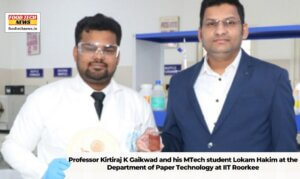Plastic Waste is One the greatest problem that we need to counter moving toward sustainability, and slowly we are heading toward that better sustainable world. Recently The Indian Institute of Technology (IIT) Roorkee researchers have developed a water-based edible ink from plants for printing and packaging applications.
📜 Details
The edible ink developed at the Department of Paper Technology, IIT Roorkee is manufactured from 100 percent plant-based material — catechu without using any chemicals.
This ink is a substitute for synthetic ink, which is
- fully environmentally friendly,
- Non-toxic, and
- Suitable for different packaging and printing applications.
The edible ink developed by Professor Kirtiraj K Gaikwad and his MTech student Lokam Hakim at the Department of Paper Technology at IIT Roorkee addresses the challenge of finding an environmentally friendly substitute for food printing.

Professor Gaikwad said
The Idea Behind Such Ink that is edible came after studying the harmful effects of stickers pasted on fruits using adhesive. We researched for around one and a half years and succeeded in developing this ink based on a plant material called catechu, Which has properties of natural dye and shows some medicinal and anti bacterial properties as well.
🕵️ About Catechu
Catechu is an extract of acacia trees used variously as a food additive, astringent, tannin, and dye. It is extracted from several species of Acacia, but especially Senegalia catechu (Acacia catechu), by boiling the wood in water and evaporating the resulting brew. It is also known as cutch, black cutch, cachou, cashoo, terra Japonica, or Japan earth,
🥷 Problems With Synthetic Ink
In the recycling of packages, synthetic ink is difficult to separate from printed packages, and the results can contribute to worsening environmental conditions.
This is especially true in a country like India, where the consumption of packaging is estimated to be nearly as huge as 373.6 billion units in 2021.
Solvents and chemical components present in synthetic ink can lead to skin irritation and dermatitis upon skin contact.
The developed ink is made from 100 percent plant-based material that is “catechu” (without using chemicals) and is considered a food and non-food substrate for printing.
🏷️ Surface Branding
Surface branding refers to brand stickers placed on fruits and vegetables. These stickers also contain different additives with low toxicity, so any exposure from the occasional, unintentional consumption of a sticker would be expected to be a health concern. The developed ink is edible and can be used for printing on fruits and vegetables as an alternative to stickers.
Share this News with your Environmentalist Friend, On WhatsApp and LinkedIn.